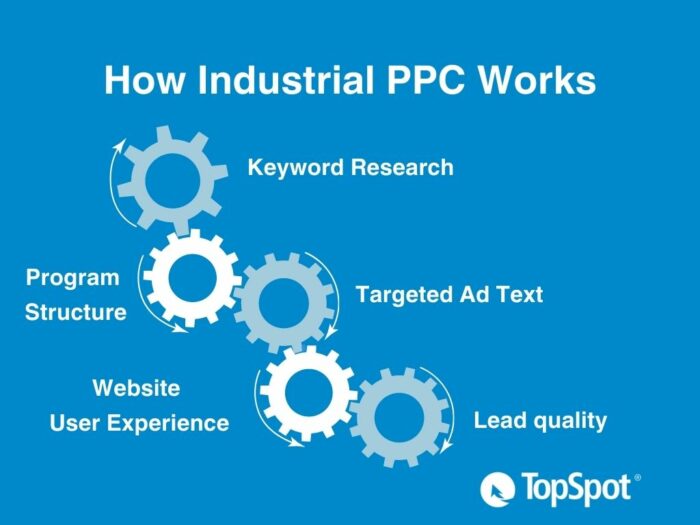June 08 2023
Why PPC is Important for Industrial Businesses
What is PPC?
Paid search is a digital marketing strategy that sees businesses pay search engines for top placement in search engine result pages (SERPs) by bidding on keywords a user looking for specific products and services might type into the search bar. Paid search, also known as pay-per-click (PPC), sees businesses only paying when users click on a sponsored ad within a search engine.

Why is PPC Different for Industrial Companies?
While every SERP is unique, most include three or more paid search ads at the top of the result, followed by features like image carousels and frequently asked questions (People Ask). While larger retailers in the B2C space can spend large budgets on broad keywords, many B2B businesses sell technical products and services for specialized uses. Bidding on broad keywords can result in wasted funds for these companies as they share space with B2C giants

A successful industrial B2B pay-per-click strategy targets users with purchase intent for specific solutions while driving them to content that sets the business apart from the competition. When part of an integrated approach that includes search engine optimization (SEO), analytics, and user behavior—PPC for industrial brings in the right traffic to your website and results in quality leads.

Industrial Buyer Intent and Search Behavior
An integrated strategy begins with creating targeted keywords based on an in-depth understanding of the decision-making process of engineers, industrial procurement, and other industrial buyers. B2B buyers experience longer lead cycles because they require research, quotes from multiple vendors and are just one in a team of decision-makers.
Once you understand your buyers’ circumstances and intent, you can begin formulating possible search terms they might utilize. Informing user intent accurately requires analytics, pulling data from past searches, form fills, and calls. Aligning these terms with your products, services, and capabilities completes the process. TopSpot employs its B-SMART Method® to help define your users by their searches and create content that will populate the right searches for the right users.

An original equipment manufacturer (OEM) focused on small, fabricated parts made of stainless steel bids on the keyword phrase steel fastener. This phrase generates traffic that includes a range of buyers, including B2C consumers. The business is also competing with large retailers like Home Depot in this SERP.
The B-SMART Method® in Action
Using the B-SMART Method®, this OEM would focus on specific types of fasteners, such as a286 steel fasteners, which drives relevant leads to the business.
These keywords power content on your website and your SEO for organic results, and then can be used in your bidding strategy for PPC. This combination can result in your business populating searches in multiple places, increasing click chances.
Where an SEO program benefits from combinations of keyword phrases to cover a range of search possibilities, a PPC strategy must be extremely focused on customer intent to maintain a budget. Asking “what if” on keyword phrases becomes costly. By determining keyword phrases based on a clear understanding of the products and services aligned with their buyer’s intent, spending becomes more effective in terms of ROI.

Benefits of PPC to Manufacturers
Manufacturers and business owners in the industrial space benefit from a PPC program as these strategies are proven to drive ROI and qualified leads. Again, when considering longer B2B buyer’s journeys or purchasing cycles for industrial goods, many users require multiple visits and come in through multiple channels. Tracking each visit and channel helps ROI by identifying the channels and content that result in quality traffic to adjust budgets accordingly.
By utilizing form and call analytics, you can identify high-quality leads and adjust your PPC program according to their behavior. Your lead data is a great place to pinpoint new keyword variations and user trends. It can also be a great place to identify new areas of opportunity for your business.
Differentiate Your Business
An industrial PPC marketing strategy needs optimization to stay in front of changing markets and user behaviors. Being strategic with your program’s campaign structure is the first step toward generating targeted online leads. For example, u-bolts are more profitable than regular bolts. A bolt distributor should structure their program to focus more daily budget on the profitable u-bolts than other bolt offerings.
While targeting the right buyers is important, excluding the wrong ones is vital to keeping premium leads in focus. Through ongoing refinements to your paid search program’s negative keyword list, a business can ensure the budget is applied to high-quality traffic.
Depending on your industry, some elements in a quote are non-negotiable. A project bid could be won or lost based on the ability to meet specific project requirements, such as working with an exact alloy type, machining tolerance, or quality assurance program. Many of our Clients meet strict requirements like ISO 9001:2015, which their buyers need to be aware of. Including targeted technical information within your ad text will attract the right website traffic and help the decision-making process with targeted specific content.
What’s Your Takeaway?
Your industrial PPC program requires frequent adjustments to keep pace with the evolving markets, competition, and search engine algorithms—meaning changes to keywords, negative keywords, and ad text. It is crucial to keep testing new content and strategies to discover what works for your business.
Bringing in a team of experts who act as an extension of your business can help make this feat manageable. Contact TopSpot to learn more about industrial PPC as part of an integrated digital marketing strategy tailored to your buyers.
Tags: B2B, industrial, manufacutring, ppc
